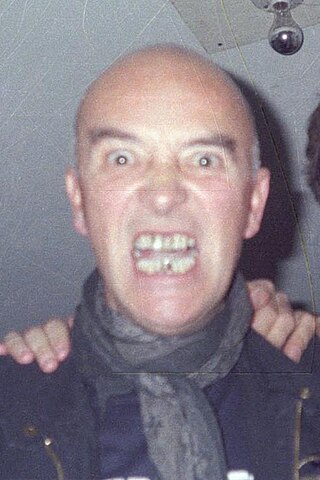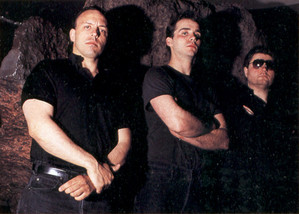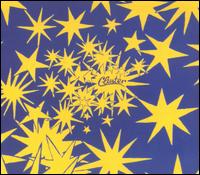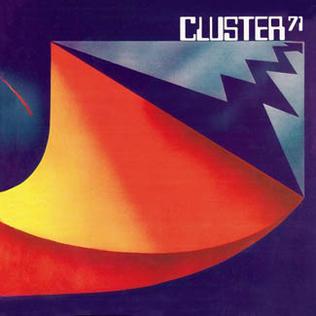
Cluster were a German musical duo consisting of Hans-Joachim Roedelius and Dieter Moebius, formed in 1971 and associated with West Germany's krautrock and kosmische music scenes. Born from the earlier Berlin-based group Kluster, they relocated in 1971 into the countryside village of Forst, Lower Saxony, where they built a studio and collaborated with musicians such as Conny Plank, Brian Eno, and Michael Rother; with the latter, they formed the influential side-project Harmonia. After first disbanding in 1981, Cluster reunited several times: from 1989 to 1997, and from 2007 to 2010.

Electronic Meditation is the debut album by German electronic music group Tangerine Dream. It was released in June 1970 by record label Ohr.

Conrad "Conny" Schnitzler was a prolific German experimental musician associated with West Germany's 1970s krautrock movement. A co-founder of West Berlin's Zodiak Free Arts Lab, he was an early member of Tangerine Dream (1969–1970) and a founder of the band Kluster. He left Kluster in 1971, first working with his group Eruption and then focusing on solo works. Schnitzler participated in several collaborations with other electronic musicians.

Maurizio Bianchi is an Italian pioneer of industrial music, originating from Milan.

Controlled Bleeding was an experimental music group based in Massapequa, New York. The group was founded by Paul Lemos, the group's only consistent member. Most of Controlled Bleeding's released recordings feature two main collaborators, Chris Moriarty and vocalist Joe Papa, who both died in the late 2000s. In February 2020 Lemos announced that the band had dissolved.
Kluster was a Berlin-based German experimental musical group formed in 1969 by Hans-Joachim Roedelius, Conrad Schnitzler, and Dieter Moebius. Their improvisational work presaged later industrial music. The original Kluster was short-lived, existing only from 1969 until mid-1971 when Conrad Schnitzler left and the remaining two members renamed themselves Cluster. Schnitzler later revived the band from 1971 to 1973 and then from 2007 until his death in 2011.

Großes Wasser is the seventh album by the electronic music outfit Cluster. It was co-produced by former Tangerine Dream member Peter Baumann. Großes Wasser marked the return to Cluster working as a duo of Hans-Joachim Roedelius and Dieter Moebius after two albums collaborating with Brian Eno.

Hans-Joachim Roedelius is a German electronic musician and composer, known as a co-founder of the influential 'kosmische' groups Cluster and Harmonia. He is notable for his prolific discography either as himself, as part of a band, or in collaboration with other artists. He has more than 100 releases with his name. He also performed in the ambient jazz trio Aquarello, and released several solo studio albums.

Cluster II is the second full-length album by German electronic music act Cluster, released in 1972 by record label Brain.

Zwei-Osterei is the second full-length album by German experimental music trio Kluster. The album title translates to English as "Two - Easter egg".

Eruption is the third and final full-length album by German experimental music trio Kluster. It is also the only live recording issued by Kluster.

Cluster is the debut studio album by German electronic music outfit Cluster. It was recorded in 1971 and released the same year by record label Philips. It is also the only album on which producer Conny Plank is credited as a member.

Live in Vienna, 1980 is a live collaborative album by German electronic music outfit Cluster and percussionist Joshi Farnbauer. It is the first of four live albums recorded by Cluster, and their only work with Farnbauer.
Eruption was a short-lived German krautrock or experimental music super group founded by former Tangerine Dream member and then current Kluster member Conrad Schnitzler.
Moebius & Plank was a German electronic music duo consisting of musicians Dieter Moebius and Conny Plank. They recorded three albums between 1979 and 1986 as well as two additional albums, one a collaboration with Mani Neumeier and the other with Mayo Thompson. Plank died of cancer in 1987. Their final two albums were released posthumously in 1995 and 1998 respectively

Craps (After Hours) is the second album by American comedian Richard Pryor, released in 1971 on the Laff Records label.
Tangerine Dream bootleg recordings are performances by Tangerine Dream that have attained some level of public circulation without being available as a legal release. The term most often refers to audio recordings, but also includes video performances. Bootleg recordings arise from a multitude of sources, including covertly copied live concerts, studio outtakes, broadcast performances. Some bootlegs have included material from official releases.

Flieg' Vogel fliege is the ninth solo album by keyboardist Hans-Joachim Roedelius, best known for his work with Cluster, Harmonia, and Aquarello. According to Roedelius biographer Stephen Iliffe this album is also titled Selbstportrait IV, but that name does not appear on the album sleeve or label. Flieg' Vogel fliege was recorded at Roedelius' home studio and completed at Erpelstudio, Vienna, Austria. Flieg' Vogel fliege was released by Sky Records on vinyl in 1982. Flieg' Vogel fliege was the final album Roedelius recorded for Sky Records.
Bureau B is an independent record label, music publisher and booking agency from Hamburg, Germany, founded in 2005 by Gunther Buskies as a sister label to Tapete Records. The label releases varieties of electronic, free-spirited music, with the spectrum ranging from pop to avant-garde. The label has amassed an extensive catalogue of reissues and new productions, including classics from the genre of electronic music in the 1970s and early 1980s popularly classified as Krautrock, alongside new recordings by such formative artists as Faust, Kreidler, Roedelius, Tietchens, Moebius.

Dead Center is a compilation album from Game Theory, a California power pop band fronted by guitarist and singer-songwriter Scott Miller. Initially released in France on Lolita Records in 1984, a newly remastered version was released on CD on November 24, 2014 on Omnivore Recordings.















